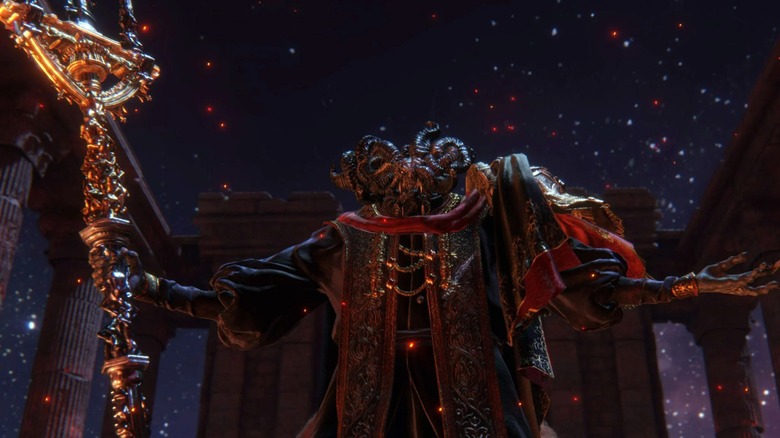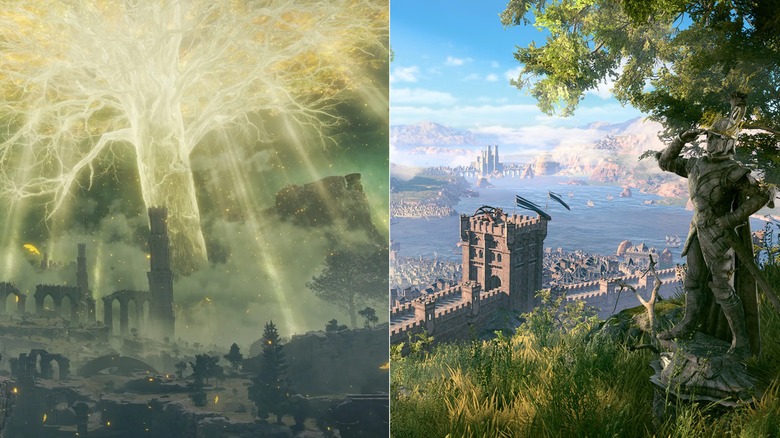There Are Only Two Near-Perfect Next-Gen Games, According To Metacritic
The latest next-gen consoles — the PS5 and Xbox Series X — were supposed to deliver us a new golden age of gaming, but they haven't quite managed that just yet. After playing a few hours of a next-gen flop like "Redfall," many gamers put down their controllers and went out in search of a time machine that could go back to when "Left 4 Dead" felt cutting edge. Sadly, it seems like next-gen games are basically a mixed bag, with only a few standouts destined to be remembered for decades to come.
There's no real way to decide collectively which games come close to perfection, but Metacritic can help us figure out what a majority of players expect from their perfect game. Metacritic aggregates reviews from various news outlets and players themselves to generate a weighted average score for every game. We can argue all day about review scores, but Metacritic gives us a fair and balanced reading of the wider gaming community's opinions on various titles.
Keeping that in mind, it's interesting to look at which games the critics have confirmed as being near-perfect. Only two next-gen games even come close to the fabled 100 Metacritic score, and they're actually both tied at 96. Don't worry about sitting down; odds are good you already know what these games are going to be: "Elden Ring" and "Baldur's Gate 3." In some ways, these seem like great compliments for each other. In other ways, they couldn't be more different, which makes the search for a "perfect" game all the more complicated.
Baldur's Gate 3 and Elden Ring are the cream of the crop
There are some pretty stark differences between "Elden Ring" and "Baldur's Gate 3." For one thing, some people might quibble with FromSoftware's game being labeled "next-gen" because it's also playable on previous generation hardware. That may be true, but anyone who's played it on a modern system knows that it absolutely uses the extra power to look even more stunning, and there's almost no room to argue that "Elden Ring" raised the bar for scale in action-adventure gaming.
The biggest difference between "Elden Ring" and "Baldur's Gate 3" is the gameplay itself. Like other FromSoftware games, "Elden Ring" is all about the action. Players need quick reflexes, in addition to game knowledge, to beat its many bosses. "Baldur's Gate 3," on the other hand, is much more laid back thanks to Larian Studios' turn-based combat and the option of multiple difficulty levels to choose from. When playing "BG3," you can really take your time and think about every move you make in a way that just isn't possible in "Elden Ring."
Both games also take wildly different approaches to storytelling. Like other FromSoftware games, the story of "Elden Ring" is almost hilariously opaque, with most of the grand plot hidden in vague character dialogue, item descriptions, and other environmental details. "Baldur's Gate 3" tells a much more traditional narrative, and though both games are technically RPGs, Larian's game is way more likely to make players feel like they're taking on a defined part in a story.
Bringing it all together
On the surface, "Elden Ring" and "Baldur's Gate 3" are quite different, but where they overlap reveals a lot about what gamers want in a "perfect" game. While movies tend to get Oscar recognition for telling realistic stories, the must-play games of the year are typically a collection of science fiction and fantasy titles. FromSoftware and Larian Studios both work hard to reinforce the idea that gamers want to visit a truly fantastical setting while they play.
Another big similarity between "Elden Ring" and "Baldur's Gate 3" is the scale of each game, by which we mean the depth of the content, more than the size of the world. Unless you're a dedicated speedrunner, a single playthrough of either title is definitely going to take you more than a hundred hours. If you're a true completionist, you could easily keep chugging through these games for years without seeing every little secret hidden in them.
Outside of the actual gameplay, there's another striking similarity between these two titles: Neither is exclusive to a single platform. Whether you prefer playing on Xbox, PlayStation, or PC, you can immediately start losing yourselves in these worlds. Being widely available doesn't automatically make a game better, but it does allow more players to come together and share their experiences and general affection for that game.
Taken all together (and using Metacritic as a guide), we can't exactly create a formula for the perfect game, but we can get a general idea of how the tastes of gamers seem to be changing. Next-gen games looking to be truly great can't just rely on stunning graphics and basic open worlds. Deeper exploration, more fantastical stories, and fewer console restrictions seem to be the way of the future — and that doesn't sound half bad.



